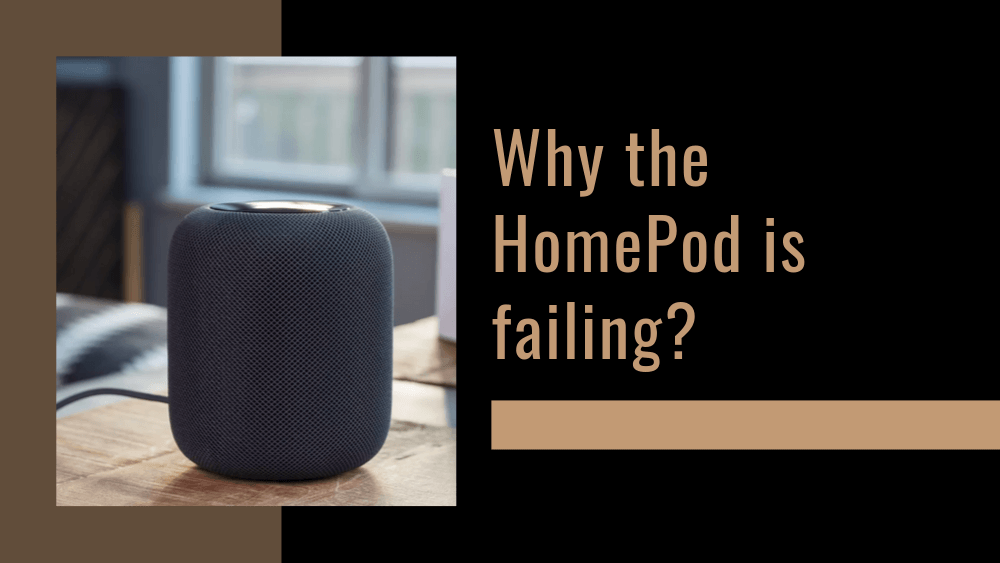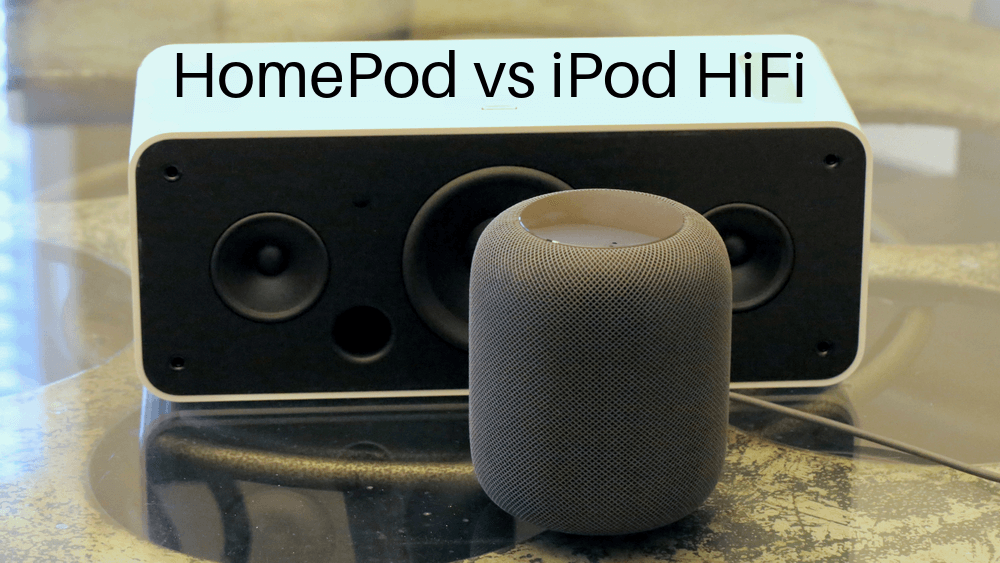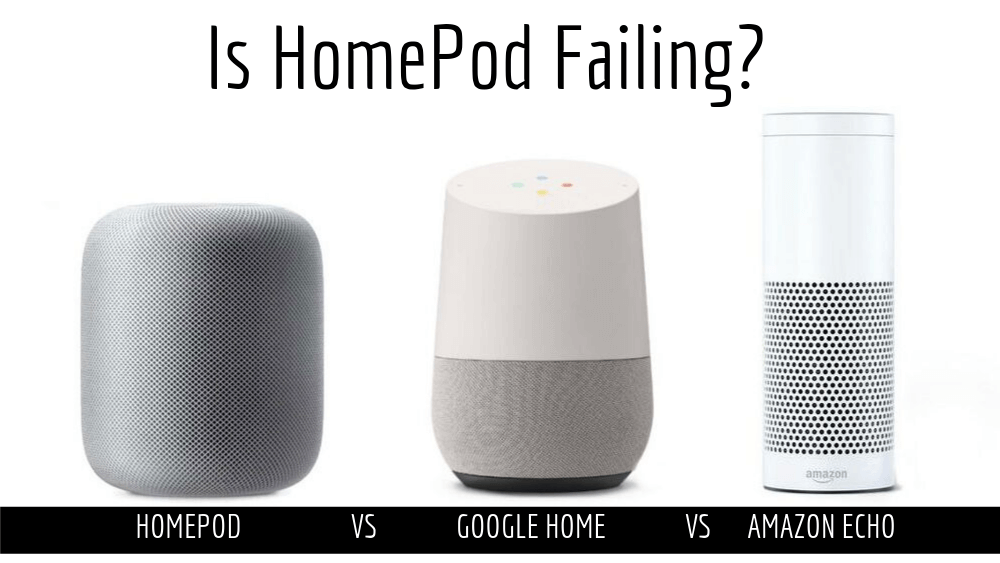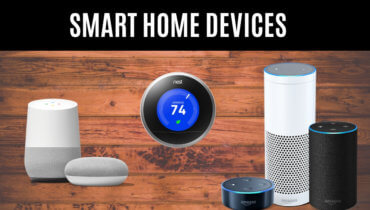
With the release of HomePod, Apple threw their hat in the smart speaker ring after seeing companies like Amazon and Google experiences success in the market. But Apple decided to approach the smart speaker from a different angle, by making sound quality the product’s primary focus instead of its voice assistant. And this created some issues that is preventing the HomePod from competing on the same level as the Amazon Echo and Google Home.
And despite being on sale for well over a year, HomePod hasn’t achieved the kind of success Apple was aiming for, capturing just 6% of the smart speaker market at the end of 2018.
And in this article we’re going to explore the reasons why the HomePod is failing to live up to Apple’s expectations. So before we talk about Apple’s struggles with the HomePod, I should mention that this wasn’t Apple’s first attempt at making a speaker system.
Table of Contents
iPod HiFi vs HomePod

Back in 2006 the company introduced the iPod Hi-Fi, which was a stereo speaker designed to work seamlessly with any iPod. It actually came with 8 different docks that you could switch out depending on which iPod model you were using.
And while the iPod Hi-Fi wasn’t a smart speaker, it did share a couple similarities to the HomePod.
1. Sound Quality
First, being it focus on sound quality. There were a lot of stereo speakers dedicated to the iPod back then, some of which, like the iHome, were very popular. But they didn’t offer hi fidelity sound quality.
And we’re seeing the same trend today with smart speakers. The most popular of which, like the Amazon Echo and Google Home, don’t offer best-in-class sound. Instead, their voice assistant features are their biggest selling point.
2. Price Point
But there’s one more similarity between the HomePod and iPod Hi-Fi, and that is their price.
They both debuted with price tags of $350, which is pretty steep considering other products on the market. In fact, the HomePods competitors share the same $100 price point as the iPod Hi-Fi’s biggest competitor, the iHome.
It’s actually pretty fascinating how similar the modern smart speaker market is compared to the iPod speaker market of the mid-2000’s. So it shouldn’t be surprising that the HomePod is experiencing similar issues as the iPod Hi-Fi.
One of the biggest being sales success. Apple struggled to convince customers that the $350 iPod Hi-Fi offered 3.5x the value of the $100 iHome.
Sure, the Hi-Fi had better sound quality, but that was about it. And considering the iHome had a built-in digital clock, a more compact and portable form factor, and a much more affordable price, you can see why the iPod Hi-Fi was a hard sell.
Apple eventually discontinued on the product one year after its release, just as rumors of an iPod Hi-Fi mini were picking up steam.
3. Convincing Customers for Sales
Now how does that circumstance compared to the HomePod’s. Well, again, there are some similarities and differences.
The HomePod is also having a hard time convincing customers that it’s worth $350.In fact, soon after it was released, Apple had to cut their HomePod orders from 500,000 a month to 200,000 due to lack of demand.
And that wasn’t the only cut Apple had to make. This past April they cut the HomePod’s price from $350 to $300. But according to recent reports, that still wasn’t enough to bolster demand. So why isn’t Apple selling as many HomePods as they expected?
After all, it does have some incredible features that the failed iPod Hi-Fi never did.
Things like Siri, adaptive sound, stereo support, AirPlay, native Apple Music support, a microphone array, and a more compact design.
HomePod vs Amazon Echo vs Google Home

Reason 1: Price and Sound Quality
Well, the answer becomes clear when you take a look at what the Amazon Echo and Google Home have to offer. For just $100, the Echo offers what some are calling “amazing sound” in addition to an extensive list of smart speaker features.
Reason 2: Multi App Support
Amazon Echo not only support the free and paid versions of Amazon Music, but the Echo also works with Prime Music, Pandora, TuneIn, iHeart, Spotify, and Sirius XM.
The HomePod only natively supports Apple Music. If you want it to play music from any other service, you’ll have to use Airplay from an Apple device.
Reason 3: Smart Assistant Features
You can also use more voice commands with the Amazon Echo, including ordering items from Amazon. With the HomePod, you’re limited to whatever Siri is capable of doing.
So there are clear compromises Apple is making with the HomePod by emphasizing sound quality above all else.
And while this may be a good approach for audiophiles, the vast majority of customers are more than satisfied with a smart speaker that sounds good enough, and costs a third of the price.
Reason 4: Sales Comparison
Now even though the HomePod is failing to meet Apple’s sales forecasts, that doesn’t necessarily mean it is a failed product. Apple doesn’t release unit sales numbers anymore but it’s estimated that they sold 2-2.5 million HomePods in its first twelve months on the market. And that is comparable to the 2.4 million Amazon Echo units that were sold in its first year.
The only problem is Amazon almost tripled those numbers in the products second year, which the HomePod shows no signs of doing. It’s also worth noting that while the HomePod only has about 8-9 percent of the smart speaker market, it’s a $300 product competing with not only $100 speakers like the Amazon Echo and Google Home, but also $50 speakers like the Echo Dot and Google Home Mini.
Marketing Strategy of HomePod:
And if you take a look at the HomePod’s website, you’ll notice that Apple doesn’t put a heavy emphasis on Siri in its marketing. The voice assistant is actually the last feature listed. And this approach may sound familiar, since it’s one they took with the AirPods which has Siri integration, but are first and foremost wireless headphones. And Apple actually suggests this connection between the two tech products by using the same “pod” suffix in their names.
And I think that’s important to recognize, because if Apple anticipated demand for the HomePod would be even half of what it was for the AirPods, it makes sense that they were preparing to sell half a million units per month.But we know Apple wasn’t even close to reaching those targets and the reason comes down to the approach they took with the HomePod.
You see, there are two ways of thinking about a smart speaker. The first way is thinking of it as a personal assistant like the Amazon Echo.
— A product that helps you buy things from Amazon, create reminds, set timers, or answer trivial questions just by using your voice. There’s not a focus on high fidelity audio.
— But the second way of thinking about a smart speaker is completely different, which is the direction Apple took with the HomePod. It does include some of the personal assistant capabilities of the Amazon Echo, it doesn’t focus on those features. Instead, Apple positioned the product as a high fidelity speaker system.
Just like they positioned the AirPods as high quality wireless headphones. And so it really isn’t fair to compare the Google Home or Amazon Echo to the HomePod, since it’s a fundamentally different product.
The problem is it’s still technically a smart speaker and included in the same market.
Final Thoughts:
And many believe Apple recognizes the HomePod’s pricing issue and it’s why there’s rumors of a stripped down, lower-cost model in the works.
But what’s fascinating to me about all this is how similar the HomePod’s story is playing out compared to the iPod Hi-Fi over a decade before.
Because the Hi-Fi also failed to meet Apple’s sales forecast, it also captured about 7% of the iPod speaker market, it was also competing against lower cost rivals which compromised on sound quality, and rumors also surfaced of Apple making a stripped-down model at a lower price point.
So in my mind, it’s worth asking if the HomePod’s story will end the same way as the Hi-Fi, will it be discontinued sometime this year?
Well, it’s hard to say, but I highly doubt it, and here’s why. With the iPod Hi-Fi, it was clear Apple wasn’t making any improvements or investing any more time into the product shortly before it was discontinued.
But when it comes to the HomePod, the story changes quite a bit. Apple is continuing to roll out the HomePod internationally with its most recent release in Japan on August 23rd.
And I don’t think that’s something Apple would bother doing if they were taking it off the market in the coming months. Also, new software features are being rolled out to the HomePod this fall with iOS 13.
You’ll actually be able to handoff music you’re playing from your phone to the HomePod by simply holding your device near the speaker.
And again, that demonstrates resources being invested in the product which didn’t happen with the iPod Hi-Fi. So while the HomePod may very well be a failure at this point in time, I don’t think it’ll see the same fate as the iPod HiFi.
Because although it isn’t selling as well as Apple had hoped, it’s still generating quite a bit of revenue for the company and further entrenching users in services like Apple Music.
And with new software features coming to the HomePod it’s pretty clear that Apple isn’t giving up on the product just yet. And I think we may be seeing a new lower-cost model in the near future which could really boost Apple’s position in the smart speaker market.

